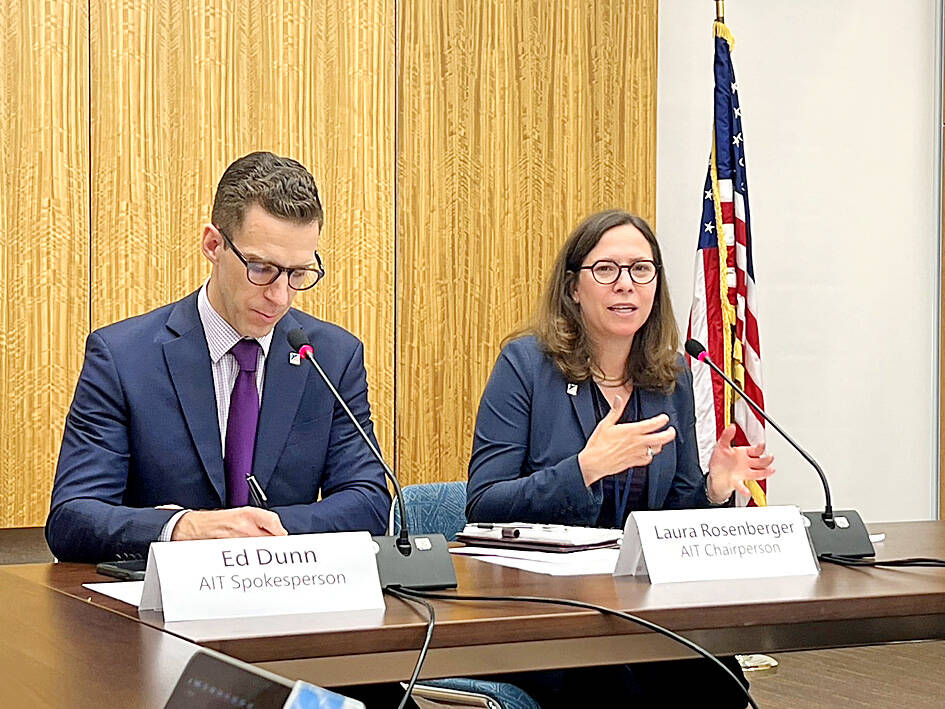The US has an enduring interest in preserving stability across the Taiwan Strait, visiting American Institute in Taiwan (AIT) Chair Laura Rosenberger said in Taipei yesterday, adding that the US would continue to advocate freedoms of navigation in accordance with international law.
The US would also continue to voice its concerns to Beijing over the latter’s actions threatening Taiwan, and damaging peace and stability in the Taiwan Strait, Rosenberger said.
In response to media queries over delays in the delivery of weapons to Taiwan by Washington, Rosenberger said that providing Taiwan with self-defense capabilities is a promise that the US would uphold and that both sides are closely cooperating on strengthening Taiwan’s asymmetric warfare capabilities.

Photo: CNA
Rosenberger, who is making her second visit to Taiwan since assuming the post on March 20, said that she is looking forward to meeting with the candidates for next year’s presidential election during her visit which lasts until Saturday.
She praised Taiwan as a beacon of democracy in the region and said that Washington had full confidence in the nation’s “free and fair elections, democratic system and electoral process.”
She said the US stance is that it supports Taiwan and looks forward to “working with whichever leaders Taiwanese voters elect in 2024.”
“The United States will not take sides and we oppose outside interference or influence in Taiwan’s elections,” she added.
The presidential election is scheduled for Jan. 13 next year. Vice President William Lai (賴清德), the Democratic Progressive Party’s presidential nominee, is to face off against Chinese Nationalist Party (KMT) candidate Hou You-yi (侯友宜) and former Taipei mayor Ko Wen-je (柯文哲), the Taiwan People’s Party candidate, in a race in which issues concerning China are likely to play a central role.
Meanwhile, when asked about the purpose of an ongoing visit to China by a senior US Department of State official, Rosenberger said it forms part of US efforts to “responsibly manage competition and the relationship with China.”
The US believes that open lines of communication are important to manage competition responsibly and ensure that it does not veer into conflict, and to find ways to address not only issues of bilateral and global concern, but also where possible to identify new ways for the US and China to work together on global challenges, she said.
US Assistant Secretary of State for East Asian and Pacific Affairs Daniel Kritenbrink is visiting China and New Zealand this week.
He has been joined by the White House National Security Council’s senior director for China and Taiwan affairs, and Kritenbrink is to discuss “key issues in the bilateral relationship” during his visit to China, the state department said in a statement on Saturday.

One of two tropical depressions that formed off Taiwan yesterday morning could turn into a moderate typhoon by the weekend, the Central Weather Administration (CWA) said yesterday. Tropical Depression No. 21 formed at 8am about 1,850km off the southeast coast, CWA forecaster Lee Meng-hsuan (李孟軒) said. The weather system is expected to move northwest as it builds momentum, possibly intensifying this weekend into a typhoon, which would be called Mitag, Lee said. The radius of the storm is expected to reach almost 200km, she said. It is forecast to approach the southeast of Taiwan on Monday next week and pass through the Bashi Channel

NO CHANGE: The TRA makes clear that the US does not consider the status of Taiwan to have been determined by WWII-era documents, a former AIT deputy director said The American Institute in Taiwan’s (AIT) comments that World War-II era documents do not determine Taiwan’s political status accurately conveyed the US’ stance, the US Department of State said. An AIT spokesperson on Saturday said that a Chinese official mischaracterized World War II-era documents as stating that Taiwan was ceded to the China. The remarks from the US’ de facto embassy in Taiwan drew criticism from the Ma Ying-jeou Foundation, whose director said the comments put Taiwan in danger. The Chinese-language United Daily News yesterday reported that a US State Department spokesperson confirmed the AIT’s position. They added that the US would continue to

The number of Chinese spouses applying for dependent residency as well as long-term residency in Taiwan has decreased, the Mainland Affairs Council said yesterday, adding that the reduction of Chinese spouses staying or living in Taiwan is only one facet reflecting the general decrease in the number of people willing to get married in Taiwan. The number of Chinese spouses applying for dependent residency last year was 7,123, down by 2,931, or 29.15 percent, from the previous year. The same census showed that the number of Chinese spouses applying for long-term residency and receiving approval last year stood at 2,973, down 1,520,

EASING ANXIETY: The new guide includes a section encouraging people to discuss the threat of war with their children and teach them how to recognize disinformation The Ministry of National Defense’s All-Out Defense Mobilization Agency yesterday released its updated civil defense handbook, which defines the types of potential military aggression by an “enemy state” and self-protection tips in such scenarios. The agency has released three editions of the handbook since 2022, covering information from the preparation of go-bags to survival tips during natural disasters and war. Compared with the previous edition, released in 2023, the latest version has a clearer focus on wartime scenarios. It includes a section outlining six types of potential military threats Taiwan could face, including destruction of critical infrastructure and most undersea cables, resulting in